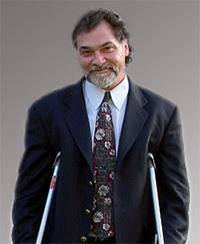 It is a writer's duty to write about human differences, all human differences, and to help make them acceptable. I think science fiction writers can do this if they want to.
It is a writer's duty to write about human differences, all human differences, and to help make them acceptable. I think science fiction writers can do this if they want to.--Octavia Butler
Writer Octavia Butler died last week, after taking a fall near her Seattle home. She was 58, and had in recent years experienced limited mobility. (She also identified as dyslexic.) Thoughtful science fiction writers have, in recent years, been willing to explore the meanings of disability, and Butler was no exception. The first line of her first novel, Kindred (1979) reads, "I lost an arm on my last trip home. My left arm." Lauren Olamina, the main character in her best-known books, Parable of the Sower and Parable of the Talents, has "hyperempathy syndrome"--sometimes this condition operates as a burden, and sometimes as a gift, but always as a lived, visceral experience. In the short story collection Bloodchild, at least two of the stories are worth a look for their disability themes: "Speech Sounds," which won the Hugo Award for best story, is about an epidemic virus that destroys various verbal abilities--so some people can no longer read, others can no longer speak, etc.--and about the social adaptations and maladaptations that might follow such a change. "The Evening and the Morning and the Night" is about genetics and personal responsibility, about getting and living with a hard, hopeless diagnosis. They're thought-provoking portrayals that might work very well for classroom discussion. And now the Butler oeuvre is closed, much, much too soon.
A few other bloggers on Butler's sudden passing: Acephalous, Oscar Chamberlain at Cliopatria, Edward Champion, Pam Spaulding, Mark Lamont Hill, Tim Burke at Easily Distracted, Tyler Cowen at Slate. I'm sure there are others.
Update 3/10: Josh in Comments points us to Matthew Cheney's good list of links to other remembrances here.
Some print resources for further reading:
Marilyn Mehaffy and AnaLouise Keating, "'Radio Imagination': Octavia Butler on the Poetics of Narrative Embodiment," MELUS 26(1)(Spring 2001): 45-76.
P. G. Stillman, "Dystopian Critiques, Utopian Possibilities, and Human Purposes in Octavia Butler's Parables," Utopian Studies 14(1)(2003): 15-35.
N. Jesser, "Blood, Genes, and Gender in Octavia Butler's Kindred and Dawn," Extrapolation 43(1)(2002): 36-61.





